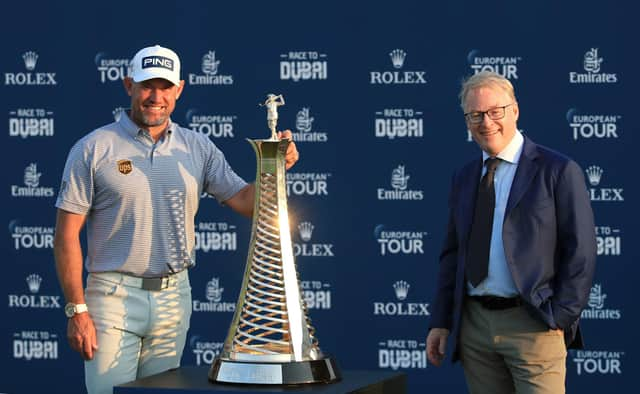Why European Tour is still a cracking product without too many changes


We’ve just been handed a timely reminder, though, about why so many things on the European circuit should stay exactly as they are because the season-ending DP World Tour Championship in Dubai was a terrific endorsement for the game on this side of the Atlantic and its players.
First and foremost, hats off to chief executive Keith Pelley and his team for the effort, expertise and endeavour it took to not only allow that finale take place in Dubai but also 22 events in the run up since the tour came out of its Covid-19 lockdown in July.
Advertisement
Hide AdAdvertisement
Hide AdEvery single one of those tournaments represented a major challenge, so for the circuit to have visited Austria, England, Wales, Ireland, Scotland, Spain, Portugal, Italy, Cyprus, South Africa and, finally, the United Arab Emirates in the midst of a pandemic without encountering any major health issues is truly one of the finest achievements in the tour’s history.
The first full event after the restart, of course, was the Betfred British Masters at Close House, near Newcastle, and how fitting is it now that Lee Westwood hosted that tournament before giving his full support to the revamped schedule for the second half of the year.
The 47-year-old teed up in events he didn’t really have to - the AXA Scottish Championship at Fairmont St Andrews in October being one of them - and, boy, was he rewarded in the end as the points he picked up contributed to a fantastic third Race to Dubai title triumph on Sunday.
Westwood epitomises what the European Tour is all about. Through the circuit, he’s cut his teeth in the paid ranks and learned to win all over the world but, at the same time, has never forgotten about his golfing roots and never will.
His contribution to European golf is simply immeasurable, though a cast-iron Ryder Cup captaincy, probably in Italy in 2023, will ensure that is rightfully recognised.
There was way much more, though, than Westwood’s latest Harry Vardon Trophy win, one that came 20 years after the first success, that generated a feel good factor about the European game in its biggest event so far since that new alliance was rubber-stamped by Pelley and his PGA Tour counterpart, Jay Monahan.
It’s hard to believe that Matt Fitzpatrick is just 26 as he seems to have been around for ages, certainly in comparison to some others, and, though someone who always seems to be a bit under the radar, what a fantastic role model he is for every single youngster on this side of the Atlantic.
With two DP World Tour Championship wins now in the bag and up to 16th in the world, here’s hoping the Yorkshireman can really kick on from here and let his talent shine in majors and Ryder Cups.
Advertisement
Hide AdAdvertisement
Hide AdThen, of course, we had the new wave of exciting European players making their presence felt over an exciting four days on the Earth Course at Jumeirah Golf Estates, which really is a terrific venue for that last lap in the Race to Dubai.
Norway’s Viktor Hovland, Finn Sami Valimaki, Spaniard Adri Arnaus and, of course, our very own Bob MacIntyre. They were all in the mix heading into the final round and exciting futures lie ahead for all of them, as well as Dane Rasmus Hojgaard and South African Christiaan Bezuidenhout.
Think about that mix of countries for one second. The European Tour and the Challenge Tour, its feeder circuit, continue to be a breeding ground for players from so many different countries and long may that be the case because, let’s face it, that’s what makes golf an appealing spectacle on this side of the pond.
The likes of Patrick Reed and Collin Morikawa - it would have been a bit of an embarrassment, incidentally, if he’d won the Race to Dubai at the weekend without actually playing as a pro on European soil - can keep coming over here as often as they want and be joined by some of their compatriots, as seems inevitable as that link up pans out.
However, it would serve no purpose whatsoever if the European Tour becomes flooded with Americans because that, of course, would be damaging in the long run to someone like Laurie Canter, for example.
What a brilliant performance it was from the 31-year-old Englishman last week in his attempt to land a breakthrough win with an almighty bang and, like so many others connected to the European circuit, it’s pride he can be feeling right now.
Love live the European Tour because, quite frankly, it’s a bloody good product as it stands.
A message from the Editor:Thank you for reading this article. We're more reliant on your support than ever as the shift in consumer habits brought about by coronavirus impacts our advertisers.
If you haven't already, please consider supporting our trusted, fact-checked journalism by taking out a digital subscription.
Comments
Want to join the conversation? Please or to comment on this article.
